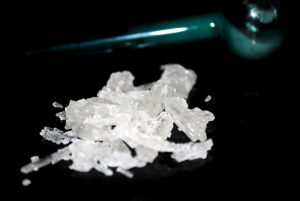Methamphetamine is a potent, incredibly addictive and an illegal stimulant. It affects the central nervous system. In its crystal form, it looks like glass fragments or shiny, blue rocks.
Although it is chemically similar to amphetamines, the drug used in treating attention-deficit hyperactivity disorder (ADHD) and narcolepsy, methamphetamine is very different — it as a federally controlled substance with no medical value.
Meth Withdrawal Symptoms
When addicted to meth, the body is dependent on the drug. It will crave it over and over, and if it does not get it, uncomfortable withdrawal symptoms could begin. Quitting meth can be so difficult and uncomfortable that many people will often give up trying to quit. The symptoms are too intense for them to overcome on their own.
Just like most other drugs, the withdrawal symptoms are not only physical but mental as well. The withdrawal process generally begins 24 hours after your last dose. Here are some of the most common symptoms seen in those withdrawing from methamphetamines:
- Anxiety
- Fatigue
- Sleepiness
- Mood Swings
- Dry Mouth
- Itching
- High Blood Pressure
- Mild Paranoia
- Depression
- Loss of sexual pleasure
- Tough to feel happy feelings
- Carb Cravings
- Meth Cravings
- Psychosis
- Suicidal thoughts
Stages in the Meth Withdrawal Timeline
Not everyone gets through the meth detox process in the same time frame. The pace at which you go through the timeline and the severity of symptoms will depend on factors like:
- The level of addiction
- Type of drug
- Frequency taken
- Length of time addicted
- Supportive network
- Polydrug use
- Age
- Metabolism
- Overall health condition
- Mental health condition
- Dietary habits
There are three main parts of a meth withdrawal timeline: the crash, the cravings, and the recovery. The crash stage can cause some people to become very depressed and perhaps suicidal. It is best if those struggling with meth addiction go through the detox phase under the care of substance abuse professionals at a residential treatment center. The reality is that the symptoms can be very painful, and professional support can help you get through them.
The process of meth withdrawal is often a long one, sometimes taking months and months. However, it is imperative to go through it in order to get free from meth addiction.
Here is a general meth withdrawal timeframe:
Days 1-9
You may begin feeling some fatigue and sadness within a few hours of your last dose of the drug. The first few days of the timeline is known as the crash. You may notice a massive decrease in cognitive ability, along with a strong decline in the amount of energy you have. This is where some people start to experience anxiety, depression, vivid dreams, cravings, large appetite, paranoia, and hallucinations.
On days four through nine, you will probably still experience a variety of withdrawal symptoms for the next week, with some of them peaking. Others may begin to wear off. This will vary from person to person, depending on the level of addiction.
Day 10 – Week 10
The cravings part of the timeline can take up to 10 weeks. This is when your body starts craving the euphoric feeling of meth again. Since this part can be mentally exhausting and draining, a lot of people will begin to feel depression and insomnia during this time. If you are feeling those things, know that it is normal and just another step towards recovering. Try your best to sleep when you can and focus on not wanting to start the whole process over again and the fact that you have come so far already, even if it does not feel like it.
Week 10 and Beyond
This timeframe is not necessarily exact since it will depend on your addiction and history with abusing the drug. However, once you get past a couple of weeks into the detox process, meth cravings will begin to be less and less. It is very important during this time to make sure you have a supportive and safe environment to assist your recovery. This is one reason many people opt to attend a residential treatment center, so they can get through the detox process with a lot of support.
Why Should I Detox?
Just like any other addiction, it is advised to start detoxing with the supervision of a medical professional. Quitting a drug like meth cold turkey can be extremely difficult, and you have a much higher chance of relapsing. You will have more success to get clean and stay clean and have an easier detox by doing it in a medical environment such as a hospital or residential rehab facility.
You are offered exceptional recovery treatment from a team of medical professionals that have the knowledge and experience to help you get there successfully.
What is the Next Treatment Step for Meth Withdrawal?
Detoxing from methamphetamines can be one of the hardest detoxes to go through, but it is a necessary first step toward full recovery. Keep in mind that detox is part of the process and is only a small part of your journey. Nonetheless, it’s a great endeavor to conquer.
There are a few different methods of drug treatment available to you to get free from meth addiction, including:
Residential Treatment

Residential treatment is a form of treatment in which you stay in a medical center such as a hospital or rehabilitation house that has 24/7 medical assistance.
You will have access to medical staff that can help you in your recovery and detox processes.
Because of the intense withdrawal symptoms, having substance abuse professionals to assist you can help you with your mental well-being during the detox and recovery process.
During inpatient treatment, you may have a counselor specifically assigned to you to help you through the program. This trained professional is someone you can meet with to discuss how your journey is going and work on steps to create the best, drug-free version of you.
Outpatient Treatment
Outpatient treatment is an option for meth treatment. It is not highly suggested because the drug is so powerful and the success rate is lower for full recovery. It is much more of a psychological drug rather than a physical one. With this being said, studies show that 20% of those struggling with meth addiction have a six month or longer psychosis similar to schizophrenia. A study also shows a relapse rate of 20%-32% in patients that seek outpatient therapy. Since this is the case, and the detox can be long and hard, it is suggested to enter residential treatment for meth addiction.
National Institute on Drug Abuse. Methamphetamine, May 2019. Retrieved from: https://www.drugabuse.gov/publications/drugfacts/methamphetamine
Web MD. Crystal Meth: What You Should Know. Retrieved from: https://www.webmd.com/mental-health/addiction/crystal-meth-what-you-should_know
Medline Plus. Methamphetamine. Retrieved from: https://medlineplus.gov/methamphetamine.html
Very Well Mind. The effects of methamphetamine. Retrieved from: https://www.verywellmind.com/the-effects-of-methamphetamine-67591


